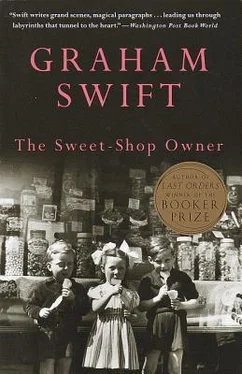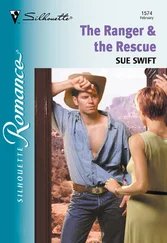Graham Swift - The Sweet-Shop Owner
Здесь есть возможность читать онлайн «Graham Swift - The Sweet-Shop Owner» весь текст электронной книги совершенно бесплатно (целиком полную версию без сокращений). В некоторых случаях можно слушать аудио, скачать через торрент в формате fb2 и присутствует краткое содержание. Год выпуска: 2012, Издательство: Vintage Books USA, Жанр: Современная проза, на английском языке. Описание произведения, (предисловие) а так же отзывы посетителей доступны на портале библиотеки ЛибКат.
- Название:The Sweet-Shop Owner
- Автор:
- Издательство:Vintage Books USA
- Жанр:
- Год:2012
- ISBN:нет данных
- Рейтинг книги:4 / 5. Голосов: 1
-
Избранное:Добавить в избранное
- Отзывы:
-
Ваша оценка:
- 80
- 1
- 2
- 3
- 4
- 5
The Sweet-Shop Owner: краткое содержание, описание и аннотация
Предлагаем к чтению аннотацию, описание, краткое содержание или предисловие (зависит от того, что написал сам автор книги «The Sweet-Shop Owner»). Если вы не нашли необходимую информацию о книге — напишите в комментариях, мы постараемся отыскать её.
The Sweet-Shop Owner — читать онлайн бесплатно полную книгу (весь текст) целиком
Ниже представлен текст книги, разбитый по страницам. Система сохранения места последней прочитанной страницы, позволяет с удобством читать онлайн бесплатно книгу «The Sweet-Shop Owner», без необходимости каждый раз заново искать на чём Вы остановились. Поставьте закладку, и сможете в любой момент перейти на страницу, на которой закончили чтение.
Интервал:
Закладка:
Yes, he would have said, enough, plenty. Were it not for that vision of himself flailing in the current — even in that smooth and molten sea which spread beneath them like a tribute of silk. Unless it was she that he saw — struggling in the gold water, beating her arms to be free of it, though her face was as golden as the waves. He stood there on the cliff top. He couldn’t save her. He owed her eternal service, for he couldn’t save her …
Every morning she read the papers. She bought them at the hotel or at the little general store in the village, where she also bought post-cards, stamps, cigarettes for him. It was her holiday, her honeymoon, but she kept up with the papers. But only as a kind of safeguard; to keep abreast of the facts, so she would not be seduced by all that sun and sea air. And one day she said, sitting on the tartan rug on the beach, as if they must get up at once and start digging defences: ‘There will be a war, Willy.’
That was only a few days before they left. They would never holiday again till Dorry was a little girl. ‘There will be a war.’ But even before that, he had noticed, she was predicting, preparing, asking herself what must be done with their future life. So that if, as they sat there on the beach, he should put his arm about her neck or nestle his head in the lap of that blue-flowered dress, she would have to humour him, mask her annoyance at the interruption of her thoughts, like a father, deep in work he has brought home from the office, having to indulge the whim of a child.
‘In a few years. You see.’
‘Yes,’ he said. He did not dispute her predictions. History came to meet you. ‘Stop reading the paper, Reny.’
He lowered his head onto her skirt. Her lap smelt of salt and sunshine. But her face turned, out and away, unsmiling, to the horizon, as if warships might loom.
So what must he do? He never planned. He could only play tricks for her, obedient tricks, as he had when he climbed that children’s slide. He would make her smile at last, with the right trick, like the sad princess in the story. She stroked his hair. He was like a cat in her lap. He would show her as he showed no one else his little stock of laughter. So he’d take the pebble from the sand and make it vanish up his sleeve; and then, twisting his wrist, return again. And he’d flip forwards and stand on his hands and walk ten yards down the beach. No one thought he could do that. Yet no one knew him. He’d been an athlete of sorts once. But she wouldn’t laugh; though he kicked his bare white heels in the sunlight and gulls took off in alarm. Her face watching him (while the blood rushed to his head and his fingers clawed the sand) was tensed and urgent. And he only knew he mustn’t topple, not for his life, topple from that fool’s posture, snapping the little wires that ran between them.
Was it that same evening, as they clambered up the cliff path, through a little dell with elder trees which the sun filled like a pool, that it happened? Her blue and white dress was taut as she climbed in front of him. Little marks of sweat appeared on it. She panted with the heat. They stopped to rest on the grass bank, behind the elder trees. And he meant, if nothing more, to pick a stem of grass and tickle her chin with it, for that would make her laugh. But when he turned she was gasping, her chest was heaving, long jagged breaths came from her throat, and she tore at the stem he held out to her, in panic, as if she were really drowning, clutching the straw, as if it were closing in to suffocate her, that golden summer-time.
It was asthma, she said, stretched on the bed in the hotel. ‘I’ve had attacks before … The heat … It runs in my family.’ She had recovered her composure; her breath was quiet, her face was calm. But he knew now the picture would never be complete. Those hands flailing in the sunlight.
4
‘Weekend, Mr Chapman?’ She said it, right on cue, plonking the tea down before him, her face the colour of the milky liquid in the mug. ‘As if you would know what a weekend is.’
‘But that doesn’t answer my question, Mrs Cooper.’
‘Well, no plans actually.’ The horn rims glinted. ‘But then if you were to have something in mind — I’d be glad — you know — to look after things.’
He lowered his face to his mug. How many times had she tried that one?
She smiled.
‘Go on. Give yourself a treat for once. I’ll manage. Look at that sunshine.’ Her eyes darted to the window. Across the road the lime trees quivered. ‘Take a trip to the coast. Get some air.’
And what she really meant was: ‘We could both have a treat, you and I. We could get the train together. Stroll arm in arm on the pier. You will put the question at last. I will no longer have to work.’
‘When did you last have a holiday? You’re not chained to this place you know.’
‘I last had a holiday, Mrs Cooper, in sixty-three. Teignmouth. Do you know Teignmouth? Devon. There are associations with the poet Keats. Know Keats, Mrs Cooper? My daughter Dorothy was fourteen.’
She blinked and tightened her lips; though her tongue smarted of course to have its say about that good-for-nothing of a girl. All that nonsense about literature, poetry, Shakespeare (guess how he knew about the poet Keats) and underneath it was only the money. But she saw, all the same, how it hurt him, how when you said the name there was a sort of wince in his eyes; as though he pulled down a shutter: Don’t trouble me any more.
She avoided his eyes now. She allowed a slightly wounded expression to cross her face. She’d never deserted him, in sixteen years. When Mrs Chapman died; when he phoned up that time and began, ‘Mrs Cooper, I’m afraid you must manage without me for a few days …’ — Hadn’t she offered to do all she could, to come round in the evenings to cook, to tend (‘No, Dorry’s at home,’ he’d said); and hadn’t she even wept a tear herself all alone in the shop, at this very same hour, when normally she would make his tea and say, ‘How’s Mrs Chapman, Mr Chapman?’ Not that you hadn’t seen it coming. She’d been ill for years. But to see him return to the shop again for the first time, with his face empty, a dummy going through the motions. You knew then what made him tick.
‘Is there nothing Mr Chapman, nothing at all?’ She would have comforted him. A fortnight after the funeral she had her hair done; bought a new corset. But it was all Dorothy then. Dorothy, Dorothy. She might have had her chance, with time, if it hadn’t been for Dorothy. So she was almost glad when the little bitch ran off like that, taking the things, demanding the money (if only he’d said just how much money). ‘Oh I’m sorry Mr Chapman, truly sorry. See how they turn out in the end. Better off without her. Is there nothing? Nothing at all?’ And he’d relent at last and see, surely, how she’d been his comfort all along.
She ran her palms down over her hips.
‘Sixty-three, Mr Chapman? That’s eleven years ago.’
‘Yes. Eleven years.’
She snorted, as if the stretch of time made its own comment. Her throat trembled slightly. Her horn-rimmed glasses and large, curved nose gave her the look of an ageing bird of prey. Her features were all strained and compressed with effort on the end of that loose neck. Perhaps it was her corsets.
‘She’s grown up since, hasn’t she? More’s the pity.’
‘Yes, Mrs Cooper.’ She’d never been beautiful, with that bird’s face. ‘She’s grown up. She takes her own holidays now.’
He finished his tea. She picked up the mug and held it next to her bosom. She would pour him another.
‘Well don’t you fret over that. She’s not worth it.’ And she could have almost reached out and touched his hand there, resting on the copy of the Daily Express . She knew what he was thinking, with those little glances of inspection. She wasn’t much to look at. She knew that. And perhaps that was what kept him there behind his shutters. For Mrs Chapman must have been beautiful, that must have been the trick of it. Though she’d no way of being sure. She’d never seen her, incredible though it was. In sixteen years Mrs Chapman had never come into the shop. But it must have been beauty — what else? — that kept him running to heel like that. And if she could do it, in an invalid chair, why not herself?
Читать дальшеИнтервал:
Закладка:
Похожие книги на «The Sweet-Shop Owner»
Представляем Вашему вниманию похожие книги на «The Sweet-Shop Owner» списком для выбора. Мы отобрали схожую по названию и смыслу литературу в надежде предоставить читателям больше вариантов отыскать новые, интересные, ещё непрочитанные произведения.
Обсуждение, отзывы о книге «The Sweet-Shop Owner» и просто собственные мнения читателей. Оставьте ваши комментарии, напишите, что Вы думаете о произведении, его смысле или главных героях. Укажите что конкретно понравилось, а что нет, и почему Вы так считаете.












